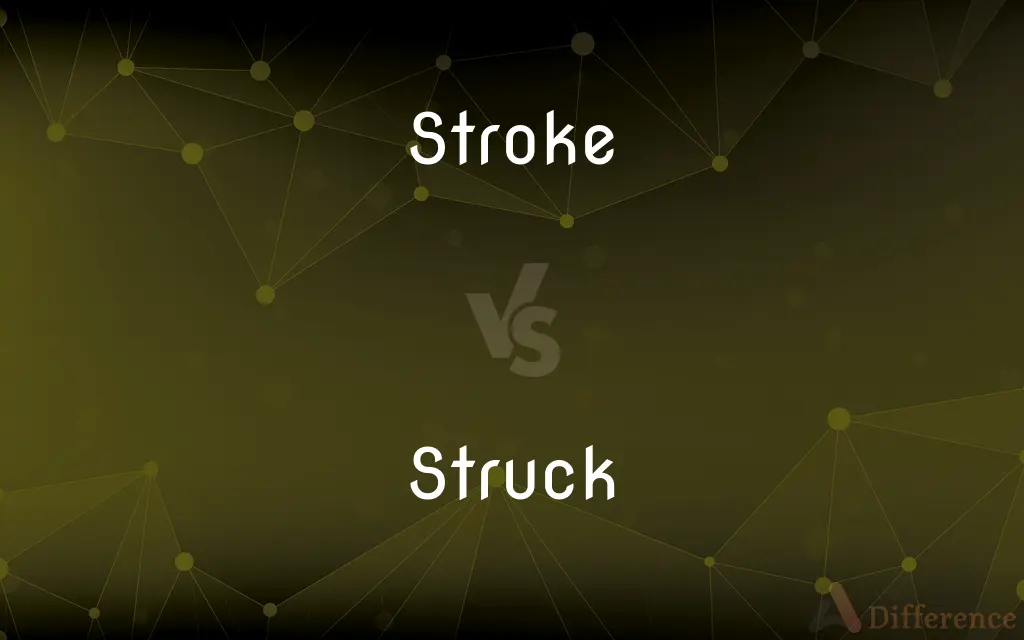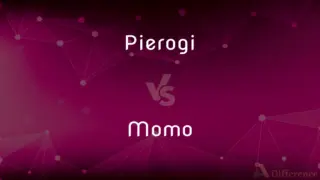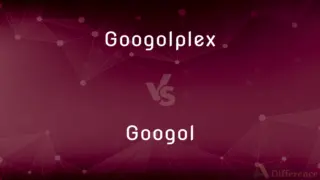Stroke vs. Struck — What's the Difference?
By Maham Liaqat & Urooj Arif — Updated on April 30, 2024
Stroke involves a gentle, sweeping motion or a serious brain injury, while struck is the past tense of strike, indicating hitting or impacting forcefully.

Difference Between Stroke and Struck
Table of Contents
ADVERTISEMENT
Key Differences
In terms of physical action, to stroke something means to touch or rub it gently, usually with the hand, in a loving or careful manner, whereas struck often connotes a single, forceful action as part of past events, like being hit by an object or a sudden idea.
When discussing medical terms, a stroke is a critical condition that can lead to significant health impacts, including paralysis or speech impairment. Struck does not pertain to health conditions but could be used in medical narratives to describe an injury, such as "struck on the head."
In literature, to stroke can also mean to support or encourage someone, using the action as a metaphor for gentle encouragement. In contrast, struck might be used more dramatically to signify a sudden or profound realization, as in "struck by a thought."
In usage, "stroke" can function as a noun or a verb, enhancing its versatility in language. Struck, being the past tense and past participle of strike, is limited to verb forms and typically used to describe completed actions.
Comparison Chart
Part of Speech
Noun, Verb
Verb (past tense of strike)
ADVERTISEMENT
Usage in Context
Gentle touch, medical condition
Impact, hit, realization
Typical Associations
Care, gentleness, health issues
Force, suddenness, completion
Example Action
Stroking a cat
Was struck by lightning
Metaphorical Use
Encouragement, support
Sudden realization or impact
Compare with Definitions
Stroke
A mark made by drawing a pen, pencil, or paintbrush once across a surface.
The artist's strokes were delicate and precise.
Struck
To come into forcible contact or collision with something.
The car struck the tree at high speed.
Stroke
An act of hitting or striking someone or something.
With a stroke of his sword, the knight defeated his enemy.
Struck
Past tense of strike; to hit forcibly and deliberately with one's hand or a tool or weapon.
The boxer struck his opponent in the first round.
Stroke
A single continuous movement, especially one of a series in swimming or rowing.
He swam with slow, even strokes.
Struck
To produce (sound) by hitting or plucking a musical instrument.
He struck a few chords on the guitar.
Stroke
An act of moving one's hand with gentle pressure over a surface, often repeatedly.
She gave the dog a stroke down its back.
Struck
To ignite something by friction, especially to light a match.
She struck a match to light the candles.
Stroke
An act of hitting or striking someone or something; a blow
He received three strokes of the cane
Struck
To make an impression on the mind or senses.
The strange landscape struck him as eerily beautiful.
Stroke
A mark made by drawing a pen, pencil, or paintbrush in one direction across paper or canvas
The paint had been applied in careful, regular strokes
Struck
Struck is a surname. Notable people with the surname include: Adolf Struck (1877–1911), German author Hermann Struck (1876–1944), German artist Karin Struck (1947–2006), German author Paul Struck (1776-1820), German composer Peter Struck (1943–2012), German politician (SPD) Peter Struck (classicist), professor at the University of Pennsylvania.
Stroke
An act of moving one's hand across a surface with gentle pressure
Massage the cream into your skin using light upward strokes
Struck
Past tense and a past participle of strike.
Stroke
Each of a series of movements in which something moves out of its position and back into it
The ray swam with effortless strokes of its huge wings
Struck
Affected or shut down by a labor strike.
Stroke
Move one's hand with gentle pressure over (a surface), typically repeatedly; caress
He put his hand on her hair and stroked it
Struck
Simple past tense and past participle of strike
Stroke
Act as the stroke of (a boat or crew)
He stroked the coxed four to victory
Struck
(used in combination) affected by something overwhelming;
Conscience-smitten
Awe-struck
Stroke
Hit or kick (a ball) smoothly and deliberately
Markwick stroked the ball home
Stroke
The act or an instance of striking, as with the hand, a weapon, or a tool; a blow or impact.
Stroke
The striking of a bell or gong.
Stroke
The sound so produced.
Stroke
The time so indicated
At the stroke of midnight.
Stroke
A sudden action or process having a strong impact or effect
A stroke of lightning.
Stroke
A sudden occurrence or result
A stroke of luck.
A stroke of misfortune.
Stroke
A sudden severe attack, as of paralysis or sunstroke.
Stroke
An inspired or effective idea or act
A stroke of genius.
Stroke
A single uninterrupted movement, especially when repeated or in a back-and-forth motion
The stroke of a pendulum.
Stroke
A keystroke.
Stroke
Any of a series of movements of a piston from one end of the limit of its motion to another.
Stroke
A single completed movement of the limbs and body, as in swimming or rowing.
Stroke
The manner or rate of executing such a movement
My favorite stroke is butterfly. She had a very rapid stroke.
Stroke
The rower who sits nearest the coxswain or the stern and sets the tempo for the other rowers.
Stroke
The position occupied by this person.
Stroke
A movement of the upper torso and arms for the purpose of striking a ball, as in golf or tennis.
Stroke
The manner of executing such a movement.
Stroke
A scoring unit in golf counted for such a movement
Finished six strokes under par.
Stroke
A single mark made by a writing or marking implement, such as a pen.
Stroke
The act of making such a mark.
Stroke
A printed line in a graphic character that resembles such a mark.
Stroke
A distinctive effect or deft touch, as in literary composition.
Stroke
A light caressing movement, as of the hand.
Stroke
To mark with a single short line.
Stroke
To draw a line through; cancel
Stroked out the last sentence.
Stroke
(Nautical) To set the pace for (a rowing crew).
Stroke
To hit or propel (a ball, for example) with a smoothly regulated swing.
Stroke
To make or perform a stroke.
Stroke
(Nautical) To row at a particular rate per minute.
Stroke
To rub lightly with or as if with the hand or something held in the hand; caress.
Stroke
(Informal) To behave attentively or flatteringly toward (someone), especially in order to restore confidence or gain cooperation.
Stroke
An act of hitting; a blow, a hit.
A stroke on the chin
Stroke
An act of striking with a weapon; a blow.
Stroke
A single movement with a tool; also, an impact of a tool on an object.
Stroke
An act, or the sound, of the clapper or hammer of a clock hitting a bell or other striking mechanism; hence, the time when such a strike occurs.
On the stroke of midnight
Stroke
(ball games) An act of hitting or trying to hit a ball; also, the manner in which this is done.
Stroke
A movement similar to that of hitting.
Stroke
One of a series of beats or movements against a resisting medium, by means of which movement through or upon it is accomplished.
The stroke of a bird’s wing in flying
Stroke
A beat or throb, as of the heart or pulse.
Stroke
(technology) A single movement or thrust of a part (such as a piston) of a machine that moves back and forth; also, the length of this movement.
Stroke
(figuratively)
Stroke
An act causing hurt or death, especially when seen as divine punishment.
The stroke of death
Stroke
A damaging occurrence, especially if sudden; a blow, a calamity.
Stroke
An amount of work; specifically, a large amount of business or work.
A stroke of business
Stroke
A powerful or sudden effort by which something is done or produced; also, something accomplished by such an effort; an achievement, a feat.
A stroke of genius
A master stroke of policy
Stroke
A movement of a brush in painting, of a chisel in carving, of a pen, pencil, or such implement in drawing or writing, etc., in one direction; hence, a line or mark made on a surface by such an implement.
Stroke
A distinctive expression in a written composition; a touch.
To give some finishing strokes to an essay
Stroke
Influence; power.
Stroke
(turn-based games) A masterful or effective action.
Stroke
(sciences) An individual discharge of lightning, particularly if causing damage.
A flash of lightning may be made up of several strokes. If they are separated by enough time for the eye to distinguish them, the lightning will appear to flicker.
Stroke
(obsolete)
Stroke
The effect or result of a striking; affliction or injury; a bruise or wound; soreness.
Stroke
Chiefly in to have a good stroke: appetite.
Stroke
(medicine) A sudden attack of any illness, especially if causing loss of consciousness or movement, or when fatal.
A stroke of apoplexy
Stroke
(music) A bow or pluck of a string or strings of a stringed instrument; also, the manner in which a musical instrument is played; hence, a melody, a tune.
Stroke
An act of moving one's hand or an object along a surface in one direction, touching it lightly; a caress.
She gave the cat a stroke.
Stroke
(figuratively)
Stroke
A gesture of assurance given as encouragement; specifically (psychoanalysis) in transactional analysis: a (generally positive) reaction expressed to a person which fulfils their desires or needs.
Stroke
A flattering or friendly act, comment, etc., done or made to a person to influence them.
Stroke
(transitive)
Stroke
To draw the horizontal line across the upright part (of the letter t).
Stroke
Followed by out or through: to draw a line or lines through (text) to indicate that it is deleted; to cancel, to strike or strike out.
Stroke
Of a bell or clock: to chime or sound to indicate (the hour, the time, etc.).
Stroke
(rare) To mark (something) with lines or stripes; to stripe.
Stroke
(ball games) To hit or kick (the ball) with a flowing or smooth motion; also, to score (a goal, a point, etc.) by doing so.
Stroke
(rowing)
Stroke
(swimming) To strike (the water) with one's arms and legs when swimming.
Stroke
(obsolete) To depict (something) with a paintbrush.
Stroke
(intransitive)
Stroke
(swimming) To swim by making co-ordinated movements with the arms and legs.
Stroke
To move one's hand or an object (such as a broom or brush) along (a surface) in one direction, touching it lightly; to caress.
Stroke
To bring (something) to a certain condition by stroking (sense 1).
Stroke
(figuratively)
Stroke
To give assurance to (someone) through encouragement.
Stroke
To influence (someone) by convincing or flattering them.
Stroke
(agriculture) To milk (a cow or other animal); especially, to squeeze the teat of (a cow, etc.) to extract the last bit of milk from the udder; to strap dialectal, to strip.
Stroke
(masonry) To give a finely fluted surface to (stone) by carving it with a tool.
Stroke
(obsolete)
Stroke
To sharpen (a knife or other cutting instrument) by honing or rubbing it against a surface.
Stroke
(figuratively) To soothe (someone); also, to flatter or indulge (someone).
Stroke
Struck.
Stroke
The act of striking; a blow; a hit; a knock; esp., a violent or hostile attack made with the arm or hand, or with an instrument or weapon.
His hand fetcheth a stroke with the ax to cut down the tree.
A fool's lips enter into contention and his mouth calleth for strokes.
He entered and won the whole kingdom of Naples without striking a stroke.
Stroke
The result of effect of a striking; injury or affliction; soreness.
In the day that Lord bindeth up the breach of his people, and healeth the stroke of their wound.
Stroke
The striking of the clock to tell the hour.
Well, but what's o'clock?- Upon the stroke of ten. - Well, let is strike.
Stroke
A gentle, caressing touch or movement upon something; a stroking.
Stroke
A mark or dash in writing or printing; a line; the touch of a pen or pencil; as, an up stroke; a firm stroke.
O, lasting as those colors may they shine,Free as thy stroke, yet faultless as thy line.
Stroke
Hence, by extension, an addition or amandment to a written composition; a touch; as, to give some finishing strokes to an essay.
Stroke
A sudden attack of disease; especially, a fatal attack; a severe disaster; any affliction or calamity, especially a sudden one; as, a stroke of apoplexy; the stroke of death.
At this one stroke the man looked dead in law.
Stroke
A throb or beat, as of the heart.
Stroke
One of a series of beats or movements against a resisting medium, by means of which movement through or upon it is accomplished; as, the stroke of a bird's wing in flying, or an oar in rowing, of a skater, swimmer, etc.
Stroke
A powerful or sudden effort by which something is done, produced, or accomplished; also, something done or accomplished by such an effort; as, a stroke of genius; a stroke of business; a master stroke of policy.
Stroke
The movement, in either direction, of the piston plunger, piston rod, crosshead, etc., as of a steam engine or a pump, in which these parts have a reciprocating motion; as, the forward stroke of a piston; also, the entire distance passed through, as by a piston, in such a movement; as, the piston is at half stroke.
Stroke
Power; influence.
He has a great stroke with the reader.
Stroke
Appetite.
The oars where silver,Which to the tune of flutes kept stroke.
Stroke
To strike.
Ye mote with the plat sword againStroken him in the wound, and it will close.
Stroke
To rib gently in one direction; especially, to pass the hand gently over by way of expressing kindness or tenderness; to caress; to soothe.
He dried the falling drops, and, yet more kind,He stroked her cheeks.
Stroke
To make smooth by rubbing.
Stroke
To give a finely fluted surface to.
Stroke
To row the stroke oar of; as, to stroke a boat.
Stroke
(sports) the act of swinging or striking at a ball with a club or racket or bat or cue or hand;
It took two strokes to get out of the bunker
A good shot require good balance and tempo
He left me an almost impossible shot
Stroke
The maximum movement available to a pivoted or reciprocating piece by a cam
Stroke
A light touch
Stroke
A light touch with the hands
Stroke
The oarsman nearest the stern of the shell who sets the pace for the rest of the crew
Stroke
A punctuation mark (/) used to separate related items of information
Stroke
A mark made by a writing implement (as in cursive writing)
Stroke
Any one of the repeated movements of the limbs and body used for locomotion in swimming or rowing
Stroke
A single complete movement
Stroke
Touch lightly and with affection, with brushing motions;
He stroked his long beard
Stroke
Strike a ball with a smooth blow
Stroke
Row at a particular rate
Stroke
Treat gingerly or carefully;
You have to stroke the boss
Common Curiosities
How is the word 'stroke' used in sports?
In sports like swimming and rowing, a stroke refers to a complete and single movement.
Can 'stroke' be used in a negative context?
While generally neutral or positive, stroke can be negative when referring to the medical condition.
How is 'struck' used in the context of ideas?
Struck is often used to describe a sudden realization or inspiration, as in "struck by an idea."
Can 'stroke' refer to an action in art?
Yes, in art, a stroke refers to a single sweep of the brush or drawing instrument.
Is there a difference in the severity connotation between 'stroke' and 'struck'?
Yes, stroke in medical terms implies severe health risks, whereas struck generally deals with physical impacts.
What does 'struck' imply in historical context?
Struck often implies a forceful impact or a significant event in historical narratives.
What does 'struck out' mean in baseball?
In baseball, to be "struck out" means to fail in hitting the ball three times, leading to an out.
Are there idiomatic uses for 'stroke'?
Yes, "at a stroke" means all at once, indicating something done decisively and effectively.
What is the past participle of 'strike'?
The past participle of strike is struck.
What does 'struck down' imply?
"Struck down" typically implies being forcefully hit or decisively defeated.
Is 'stroke' used metaphorically?
Yes, stroke is used metaphorically to mean soothing or supporting someone emotionally.
How does 'struck' relate to musical terms?
In music, struck refers to producing a sound by hitting an instrument.
How is 'struck by lightning' different from 'stroke'?
Struck by lightning is a sudden, forceful event, while a stroke is a serious health condition usually without immediate external cause.
Can both 'stroke' and 'struck' imply suddenness?
Stroke generally does not imply suddenness except in medical contexts; struck almost always implies sudden, forceful action or realization.
Share Your Discovery

Previous Comparison
Pierogi vs. Momo
Next Comparison
Googolplex vs. GoogolAuthor Spotlight
Written by
Maham LiaqatCo-written by
Urooj ArifUrooj is a skilled content writer at Ask Difference, known for her exceptional ability to simplify complex topics into engaging and informative content. With a passion for research and a flair for clear, concise writing, she consistently delivers articles that resonate with our diverse audience.
















































